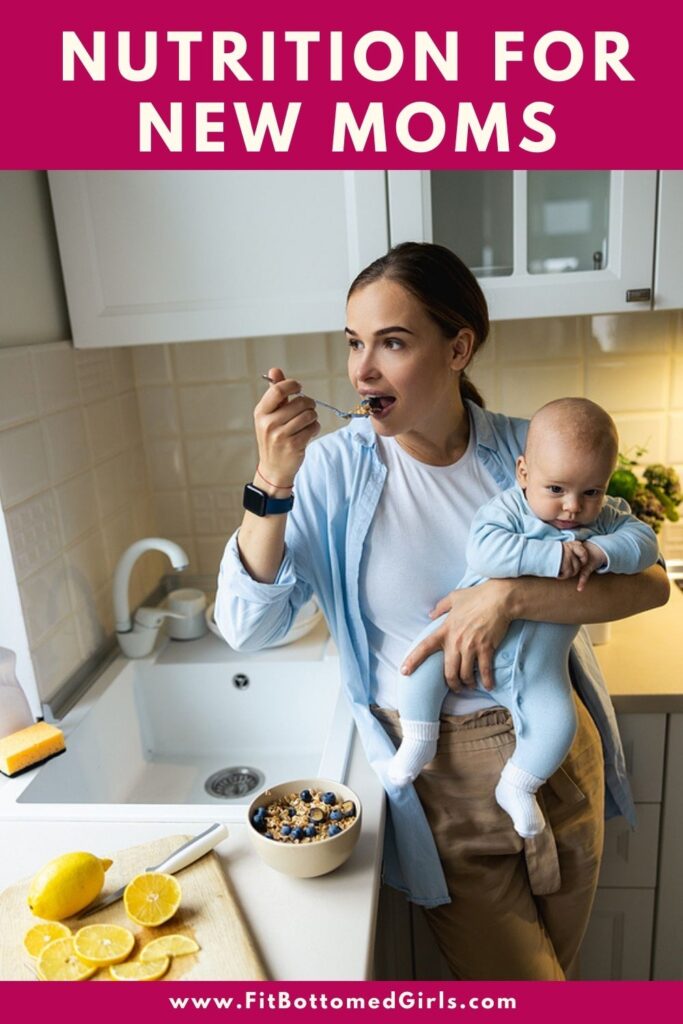Nutrition for New Moms
When you become a new mom everything changes. Like, EVERYTHING.
With your world turned so upside down it can be easy to put your own nutritional needs aside, but it’s a really, really important time to make sure that you’re getting the nutrients and the fuel that you need — especially if you’re breastfeeding and/or getting back into your workouts.
To help with that, we’re sharing this guest post on nutrition for new moms from Kim Daly Farrell, a certified health coach, former magazine editor, fitness fanatic, and mom to Keane and Julia.
Kim has worked for national media outlets, including Good Housekeeping, Glamour, and Shape, and health and fitness industry leaders, including MyFitnessPal and Fitbit. Currently, she’s calling the shots as CEO and founder of Mama Love, a nutrition company for lactating women who want to maximize their fitness gains without sabotaging breast milk safety, health, or supply. Talk about a Fit Bottomed Mama!
Read on for Kim’s top tips when it comes to nutrition for new moms.

Nutrition for New Moms: Fuel Your Fitness, Feed Your Baby
By Kim Daly Farrell
When you’re pregnant, everyone loves to remind you about your baby when you lift a fork: “Have some more! You’re eating for two!” “Watch out for the mercury in that tuna — you’re eating for two.” And even if you did have weird cravings (cheap burritos and chocolate croissants for me), more than likely you made some really smart choices that helped your body grow a happy, healthy baby. Good job, Mama!
When it comes to the post-partum period though, all those friendly voices seem to fade. And there are a lot of conflicting messages about what your body needs to look like, and how you should be fueling yourself. First of all, if you manage to have three meals and a snack or two in the haze of those no-sleep newborn days, you can pat yourself on the back.
New Moms Need to Eat
“Taking in enough calories and eating on a regular schedule is very important for new moms,” says Shivani Patel, M.D., a maternal-fetal medicine specialist and assistant professor of obstetrics and gynecology at UT Southwestern Medical Center in Dallas, Texas. “Your body needs nourishment to keep up with daily activities, and to repair and heal after delivery.”
The post-partum period is not the time to go on a strict diet. Let’s look at that sentence again, because it’s an important one. No matter how many extra pounds you think you’re carrying after delivery, a new mom needs to eat. Skimping on food will only slow down the hormonal shift that allows your metabolism and energy-storage processes to get back to that there’s-no-baby-in-here state.
And if you’re breastfeeding, not eating enough can sabotage your milk supply — because, yep, you’re still eating for two. Research shows lactating women need to take in about 500 extra calories per day to support breast milk production. “For most moms, an ideal range is 1,800 to 2,200 daily calories,” says Dr. Patel, “and a good portion of those calories need to provide protein.”
Protein Is Important Post-Partum
To make milk for your baby, your body needs around 18 to 25 grams of protein per day — that’s in addition to your regular daily needs. But baby isn’t the only one who benefits when you add more eggs, unprocessed meat, low-fat dairy, beans, and other plant-based proteins to your plate. Your body also uses that protein to rebuild and repair muscles and other tissue that came into play during your pregnancy. Remember your abs? They need protein to knit back together.
When you get the thumbs up from your OB to return to working out (which you absolutely should — exercise activates endorphins and other feel-good hormones that can ease the baby blues and ward off anxiety), your protein needs increase again. To figure out how much you should eat, you’ll need to do a little math.
Depending on your age and the intensity of your sweat sessions, you need anywhere from 0.4 to 0.7 grams of protein per pound of body weight. Let’s say you weigh 150 pounds, and you’re breastfeeding, and you’re doing workouts, your protein target could be anywhere from 78 to 130 grams per day. If that seems like a lot, keep in mind that it should be spread out over three meals and two snacks, and that meat isn’t the only source of protein.
“Everyone thinks of meat first,” says Tracy Morris, MS, an accredited dietitian and lead nutrition curriculum designer for Fitbit, “but dairy, nuts, beans, peas, and whole grains are also excellent sources of protein.” And for new moms, “Pea protein is especially good when breastfeeding as it’s not likely to cause digestion issues for baby,” she adds.
Moms Need Other Nutrients, Too
Carbs, fats, and micronutrients, like calcium, magnesium, zinc, vitamin B6, and folate, are all just as important right now for lactation. And each comes with its own recommended daily intake, or Dietary Reference Intake (DRI). (Morris made a handy chart with the daily values for key nutrients on Fitbit’s blog.)
But that doesn’t mean you have to spend mealtimes crunching numbers — that would be unrealistic even if you weren’t taking care of a demanding infant.

Luckily, all the foods you already know are healthy — fruits, veggies, whole grains, unprocessed protein — provide the vitamins, minerals, and other nutrients your body needs to keep on keeping on. And if you simply focus on eating more of those, you’ll be able to fuel your fitness goals and feed your baby.
Still, the word unrealistic hangs in the air. All of those healthy foods require time and effort —something you’re likely to be short on after changing (at least!) 10 diapers a day. And even though they’re not so “good” for you, those packaged bars and pre-portioned snacks can be hard to resist. That’s where prepping ahead helps.
On days when you do have the energy, slice enough veggies to last for a while, boil some eggs, and prep a few mason jars with just-add-liquid oats. You can also stock up on easy-to-grab snacks, like apples, bananas, and nuts, and have frozen fruit, protein powder, non-dairy or cow’s milk, and other ingredients on hand for nutrient-packed smoothies.
Continuing to take your daily prenatal vitamin, or switching to a post-natal multivitamin, can help fill in some of the micronutrient gaps created by a day or two of less than ideal eating. Like those days when you strap your baby in the car seat for a soothing ride and grab a drive-thru lunch. (Come on, I know it’s not just me!) But those pills aren’t magic bullets — you still have to make healthy choices and reach for nutrient-dense foods the majority of the time.
Don’t Forget to Drink
When you focus on whole foods and set yourself up for success, taking in the right nutrients during the post-partum period doesn’t have to be complicated. Simply up your calories and increase your protein intake to fuel your workouts and support breast milk production. Oh, yeah, and remember to stay hydrated.
There are a lot of variables when it comes to hydration — body size, metabolism, environment, activity level, the amount of milk you’re making — and, unfortunately, there isn’t one-size-fits-all advice for lactating women when it comes to how much water to swallow daily.
“But we do know dehydration can decrease your milk supply and is generally not good for your own health,” says Dr. Patel.
Her rule of thumb: “Have a glass with every meal, sip water during your workout, and rehydrate when you’re done.” From there, drink when you’re thirsty.
It might not always feel like it in the moment, but you know what you’re doing. Your body is uniquely designed to bounce back from pregnancy, build muscle during workouts, and make milk. And you know the difference between a food that’s good for you and one that isn’t.
You’ve got this, Mama! –Kim Daly Farrell

Comments
Great post!
it’s really wonderful article about the health.I think we should all follow this healthy tips. Thanks for this valuable tips.
Very good information. Thanks for sharing such valuable information. Keep it up.
Thank you for this article, especially stating that new mom’s need to eat postpartum as much as they do when pregnant and most of all it is NOT time to diet!!!!
I love to read this information and thanks for share the best diet for moms.
Wonderful tips! New mothers should definitely focus on what they are eating for them and their babies health. Thank you for sharing!
We will bring down poverty in the world by improving healthcare in developing countries. That´s bold!
We will harvest the power of digitalized healthcare such as scalability, connectivity and mobility. That´s feasible!
We will focus on epidemic diseases such as diabetes for prevention and better management. That´s focused!
#inempathy #healthcare #philanthrophy #scalability #connectivity #mobility
I think the phase of being a new mom and struggling to focus on ourselves and our own health never completely transitions even as the kids get older. Then about the time you get into a groove the second kid comes along and you do it all again. lol I’m struggling to focus on making sure I eat the right things, but have refocused over the last couple months and am getting into a groove. A workout routine is next on the list! Thanks for reminding me to just chip away and keep working on it!
You bet! Sounds like you are doing great — keep it up, mama! 🙂
–Jenn
Thank you very much for sharing valuable Article.
Ahh that is great thank you ! Good for special needs too !
Thanks for your advice. I am also the mother of 2 children.
Thanks for sharing this information, Great read.
Good I read your article such a great tips for new Moms
I second you!
read this information and thanks for share the best diet for moms.Keep it up.
Comments are closed.